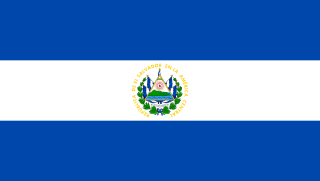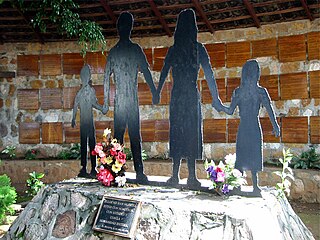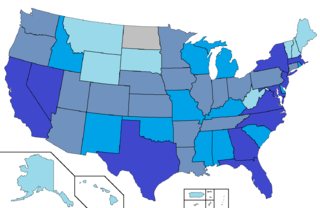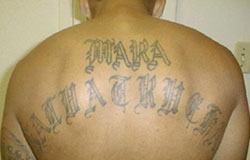
El Salvador, officially the Republic of El Salvador, is a country in Central America. It is bordered on the northeast by Honduras, on the northwest by Guatemala, and on the south by the Pacific Ocean. El Salvador's capital and largest city is San Salvador. The country's population in 2022 was estimated to be 6.5 million.

This is a demography of the population of El Salvador including population density, ethnicity, education level, health of the populace, economic status, religious affiliations and other aspects of the population.

The economy of El Salvador has experienced relatively low rates of GDP growth, in comparison to other developing countries. Rates have not risen above the low single digits in nearly two decades – part of a broader environment of macroeconomic instability which the integration of the United States dollar has done little to improve. One problem that the Salvadoran economy faces is the inequality in the distribution of income. In 2011, El Salvador had a Gini Coefficient of .485, which although similar to that of the United States, leaves 37.8% of the population below the poverty line, due to lower aggregate income. The richest 10% of the population receives approximately 15 times the income of the poorest 40%.

San Salvador is the capital and the largest city of El Salvador and its eponymous department. It is the country's political, cultural, educational and financial center. The Metropolitan Area of San Salvador, which comprises the capital itself and 13 of its municipalities, has a population of 2,404,097. The urban area of San Salvador has a population of 1,600,000 inhabitants.

The El Mozote massacre took place both in and around the village of El Mozote, in the Morazán Department, El Salvador, on December 11 and 12, 1981, when the Salvadoran Army killed more than 811 civilians during the Salvadoran Civil War. The army had arrived in the village on the 10th, following clashes with guerrillas in the area. The Salvadoran Army's Atlácatl Battalion was responsible for the massacre.

Francisco Guillermo Flores Pérez was a Salvadoran politician who served as President of El Salvador from 1 June 1999 to 1 June 2004 as a member of the conservative Nationalist Republican Alliance (ARENA). He previously served as a deputy of the Legislative Assembly from 1994 to 1999, having been president of the Assembly from 1997 to 1999.

Alfredo Félix Cristiani Burkard is a Salvadoran politician who was President of El Salvador from 1989 to 1994.

José Simeón Cañas Central American University, also known as UCA El Salvador, is a private Catholic university with nonprofit purposes in San Salvador, El Salvador. It is operated by the Society of Jesus.

The Salvadoran Civil War was a twelve year period of civil war in El Salvador that was fought between the government of El Salvador and the Farabundo Martí National Liberation Front (FMLN), a coalition or "umbrella organization" of left-wing groups. A coup on 15 October 1979 followed by government killings of anti-coup protesters is widely seen as the start of civil war. The war did not formally end until 16 January 1992 with the signing of the Chapultepec Peace Accords in Mexico City.
Jews have been present in El Salvador since the early 19th century, starting with Sephardic Jews and continuing with the arrival of refugees from Europe during World War II. El Salvador has the second largest community in Central America, the majority established in San Salvador, which is the second city with the most Jews in Central America, behind Panama City.

Salvadoran Americans are Americans of full or partial Salvadoran descent. As of 2010, there are 2,195,477 Salvadoran Americans in the United States, the fourth-largest Hispanic community by nation of ancestry. According to the Census Bureau, in 2016 Salvadorans made up 3.8% of the total Hispanic population in the US.

Lesbian, gay, bisexual, transgender, and other non-cisgender or non-heterosexual (LGBT) persons in El Salvador face legal and social challenges not experienced by non-LGBT residents. Same-sex sexual activity of all genders are legal in El Salvador, but same-sex couples and households headed by same-sex couples are not eligible for the same legal protections available to opposite-sex married couples.

Diplomatic relations between the Argentine Republic and the Republic of El Salvador have existed for over a century. Both nations are members of the Community of Latin American and Caribbean States, Group of 77, Organization of American States, Organization of Ibero-American States and the United Nations.

During the Salvadoran Civil War, on 16 November 1989, Salvadoran Army soldiers killed six Jesuits and two others, the caretaker's wife and daughter, at their residence on the campus of Central American University in San Salvador, El Salvador. Polaroids of the Jesuits' bullet-riddled bodies were on display in the hallway outside the Chapel.

There are an estimated 25,000 gang members at large in El Salvador; another 43,500 are in prison. The best-known gangs, called maras in colloquial Salvadoran Spanish, are Mara Salvatrucha (MS-13) and their rivals 18th Street; maras are hunted by death squads, including Sombra Negra. Newer rivals include the rising mara, The Rebels 13. Criminal youth gangs dominate life in El Salvador; an estimation of at least 60,000 young people belong to gangs. It is one of the three countries of the Northern Triangle of Central America, along with neighboring Guatemala and Honduras, which are all afflicted with high levels of violence.
For the period between 2005 and 2010, El Salvador had the third-lowest birth rate in Central America, with 22.8 births per 1,000. However, during the same period, it had the highest death rate in Central America, 5.9 deaths per 1,000. In 2015 life expectancy for men were 67.8 years and 77.0 years for women. Healthy life expectancy was 57 for males and 62 for females in 2003. There was considerable improvement in socioeconomic and health status from 1990 to 2015. On June 22, 2020, the Hospital El Salvador, a permanent hospital conversion of the convention center in San Salvador, was opened to the public; it is Latin America's largest hospital and was built to receive COVID-19 patients.

Nayib Armando Bukele Ortez is a Salvadoran politician and businessman who is the 43rd president of El Salvador, serving since 1 June 2019. He is the first president since José Napoleón Duarte (1984–1989) not to have been elected as the candidate of one of the country's two major political parties: the left-wing Farabundo Martí National Liberation Front (FMLN) and the right-wing Nationalist Republican Alliance (ARENA).
Palestinian Salvadorans are Salvadoran citizens of Palestinian descent or Palestine-born people residing in El Salvador. There are approximately 100,000 Salvadorans with Palestinian ancestry.

El Salvador–Peru relations refers to the diplomatic relations between the Republic of El Salvador and the Republic of Peru. Both nations are members of the Community of Latin American and Caribbean States, Group of 77, Organization of American States, Organization of Ibero-American States and the United Nations.
Anarchism in El Salvador reached its peak during the labour movement of the 1920s, in which anarcho-syndicalists played a leading role. The movement was subsequently suppressed by the military dictatorship before experiencing a resurgence in the 21st century.















